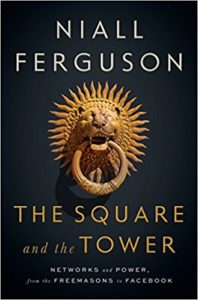
Niall Ferguson
3 Stars – Half-Assed History from a Courtesan
Niall Ferguson is neither Will Durant nor John Lewis Gaddis. He is far removed from Howard Zinn. He is, in effect, an intelligent idiot, a courtesan historian. While the book’s intent may remind one of Eric S. Raymond’s classic essay on “The Cathedral or the Bazaar,” or the book by Thomas L. Friedman, The Lexus and the Olive Tree: Understanding Globalization, the author – while spectacularly qualified in conventional, which is to say, “approved thinking,” – offers so many false notes in this book in relation to what I know to be true, that I consider this book largely worthless.
Among my early notes are these:
Elite apologist. Selective sourcing following a planned counter-narrative.
Pushes the known falsehoods about both 9/11 and the Russians intervening in 2016; accepts Zimmerman telegram in Mexico as real when it is known to be a British covert operation; completely mistaken on who funded Lenin and why.
Dismisses idea of a Deep State while recognizing that elite networks do serve to concentrate wealth.
Emphasizes how hierarchies achieve economies with scale without having the vaguest regard to true cost economics and the price we pay for internalized profit for the 1% versus externalized costs to the 99%.
Funniest useful quote – not accurate by my modern experience but telling in a catty way (186):
“While Milner’s network of Oxford men envisioned a muscular, martial, imperial, and heterosexual future, their counterparts at Cambridge aspired to almost the precise opposite. The network that evolved there in and around the Cambridge ‘Apostles’ was effete, pacific, liberal, and homosexual.”
Most stunning statement oblivious to its meaning today (218):
“By defining the slightest grumble as treason or counter-revolution, the Stalinist system was in a position to send whole armies of Soviet citizens to the Gulag.”
This is not a man who understands either of the below two links:
He is of course blissfully unaware (or obscuring with malice aforethought) the Council on Foreign Relations (CFR) view that all dissidents in the USA be treated as domestic terrorists (see Note 11 in #GoogleGestapo above).
An “intelligent idiot” – a sample quote of unintelligent idiocy (303):
“In his farewell address to the nation in 1960, Eisenhower has warned of the excessive ‘military-industrial complex’. He need not have worried. Had it been so very powerful, it would surely have prevented or at least stunted the exponential growth of the Internet and the World Wide Web.”
Something I did not know (203): Germans conceived of inspiring a Muslim jihad with an “ideological virus” aimed at the British Empire.
Something I did not know (385): Trump had 32% more Twitter followers than Clinton and 87% more supporters on Facebook.
Most banal chapter: Seven Insights
One useful chapter: The Crisis of Complexity
Crappy index.
The bottom line: despite this man’s past scholarship in writing about banking and the Rothschilds, or perhaps because of his success in writing about them in a manner that pleased them, this book appears to have set out to demonstrate that hierarchies and networks are natural competing and interactive forms of organization that produce disruptive change, and that all attempts to explain history with “conspiracy theories” or references to “secret societies” are beneath contempt. The book fails to live up to its subtitle – coverage of the Freemasons and Facebook – their power and their influence – is quite limited.
See Instead:
Robert Steele: Itemization of Information Pathologies
Review: 935 Lies – The Future of Truth and the Decline of America’s Moral Integrity
Review: The Landscape of History–How Historians Map the Past (Paperback)
Review: The Lessons of History (First Edition)
Review: Tragedy & Hope–A History of the World in Our Time
Review: Who Rules America (2013)



